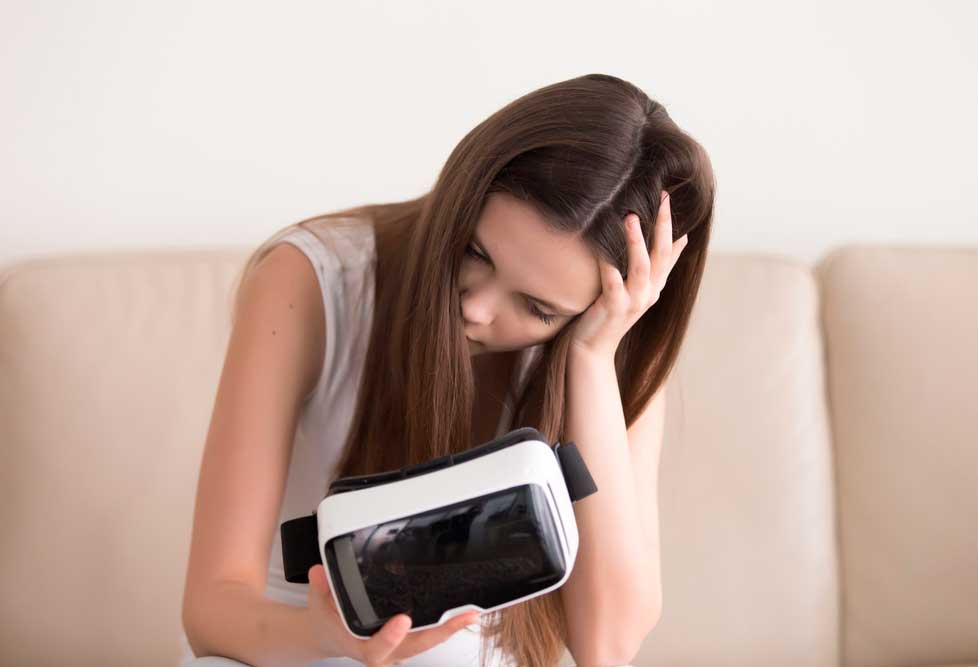Virtual reality devices (helmets, glasses) are rapidly entering our everyday lives. Digital virtual reality (VR) technology is now used for gaming and education, medical treatment, and complex transplant surgeries. Analysts believe that by 2023, the global market for VR / AR training alone will grow to $6.3 billion. However, the impact of VR technology on human health and the psyche remains poorly understood. After relatively long use of VR helmets, many people experience headaches, nausea, disorientation, and dizziness - seizures and epileptic seizures in sporadic cases. They even coined a particular term for the complex of symptoms: cyber-disease.
What happens to our body and mind? Is there a risk of getting lost in colorful fantasies, and is an extended stay in a VR helmet harmful to human health?
Let's start with the harm to eyesight. For example, modern VR headsets pose a threat to the eyes, and ophthalmologists warn of dry eye syndrome, which used to be associated only with prolonged work on the computer. According to studies, children under the age of 5-10 can develop myopia, astigmatism, and general visual impairment. However, scientists believe that if you stick to basic rules: after every hour of exposure to the screen, give your eyes a 15-minute rest, doing special exercises for the eyes, the risk of disease will be minimal.
Thus, the harm to the eyesight is not more significant than when working at a computer or using a smartphone by the manufacturer's recommended time of use. At the same time, Chinese scientists suggest treating some eye diseases with VR glasses in the future.
Many VR-headset users experience seasickness: people feel nauseous, dizzy, have a feeling of discomfort, and so on. There are two reasons for this: the constitution of each person and the imperfection of today's VR headsets. Since the problem is caused by dissonance between the various senses (e.g., vision and vestibular apparatus), the challenge for developers is to synchronize all of these human systems. Prolonged use of a virtual reality helmet can knock a person out of balance for a long time.
The game cannot simulate reality completely, so people have problems with coordination and orientation in space after coming out of it, such as spilling liquids past the mouth. The good thing is that these effects are short-lived and only occur when the player is in the helmet for an extended period. And this is now really a problem with using VR, and it remains to wait for headsets that will synchronize all the senses and create a virtual world identical to the real one.
VR helmets can be dangerous for people with mental problems because any stressful virtual reality situation can provoke many side effects. On the other hand, the concussion helps the body to adapt to develop protective mechanisms. That is why Vr helmets can be helpful in the treatment of a variety of mental disorders, for example, aerophobia. Helmets can help treat anxiety disorders, depression, post-traumatic stress disorder, and the diagnosis and training of cognitive functions (memory, attention, spatial thinking).
With frequent immersion into the virtual world, a person can get too involved in the role of his hero, which affects his behavior in real life. A person can also begin to lose the sense of time and become antisocial. However, this is a problem for all avid gamers, not just virtual reality users. At the same time, psychologists argue that virtual reality can become salvation for people with disabilities and communication limitations. There is an opportunity to communicate with other players; people can plunge into this virtual world and forget about their rules and problems.
To summarize, VR headsets should be used with caution in pregnant women, the elderly, with cardiovascular disease, epilepsy, visual impairment, and children under 13 years of age. Moreover, we will have to develop unified sanitary standards for virtual reality, compliance with which will help maintain the health of users.

